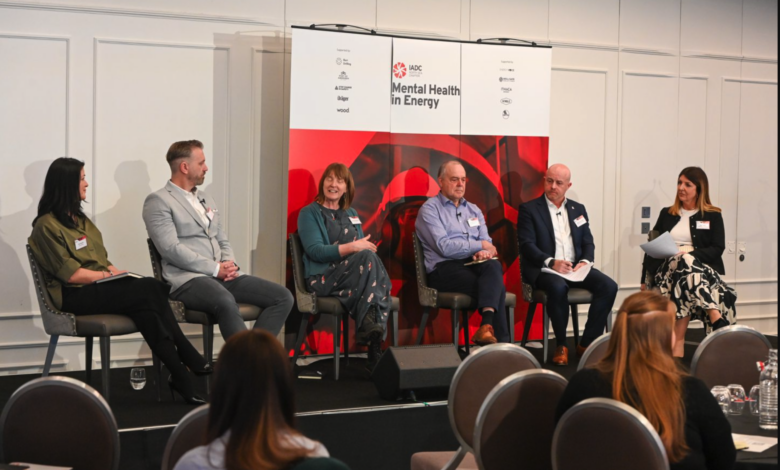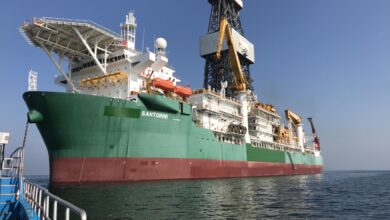IADC North Sea Chapter holds session focused on mental health

Senior figures from the UK’s energy industry have agreed to establish a mental health charter to improve the support available to workers in the North Sea. More than 150 leaders from the operator and supply chain communities joined psychologists, mental health professionals and others for and industrywide discussion on how to improve mental well-being services for offshore and onshore employees. Participants agreeed there is a critical need for action now to improve the support available to workers and reduce the industry’s growing mental health problem.
The event, which marks a turning point in the industry’s approach to mental health, was organized by the IADC North Sea Chapter in Aberdeen. It followed the recent publication of an IADC report, Changing Minds: Saving Lives, which demands an urgent new approach to mental health in the North Sea. A recent study by the International SOS Foundation of onshore and offshore workers found 40% experienced suicidal thoughts some or all of the time while on duty.
Guest speakers at the Aberdeen event included Darren Sutherland, Chair of the IADC North Sea Chapter; Reverend Gordon Craig, Chaplain to the UK Oil and Gas Industry; Cami Rose Alexander, Wellbeing and Personal Development Coach, DC Thomson; Kim Woolner, Head of People & Culture, Ithaca Energy; and Brett Townsley, Mental Health Harm Prevention & Psychological Safety Specialist and director of Omniscient Safety Innovations. The speakers highlighted the need for an industrywide culture change, led by business leaders, to achieve meaningful improvements in mental health support.
Delegates were told that, while the industry had improved its approach to mental health in recent years, including the adoption of employee assistance programs and campaigns, these had not been impactful enough.
Key issues raised included the best ways to achieve the necessary culture change, the effective measuring of improvements in mental health support and ways to share best practice.
“As an industry, we have faced many challenges over the years and have developed solutions, such as the safety case regime and time out for safety. These are programs that started in the North Sea and are now globally accepted,” Mr Sutherland said. “We have an opportunity to act together and drive change in how we approach mental health. Workers are not looking for us to speak more. They are looking for us to take action. Let’s leave a legacy of change for the workforce behind us.
“Leaders are expected to set the pace, but they also need support. We need to ensure mental health and wellbeing are part of strategic planning,” he continued. “We are measured on EBITDA and our incident frequency rates; should we be measured on how well we are doing with supporting our people, too? We talk about the need to walk the talk, but with mental health we need to walk the walk. It’s going to take leadership to make the change.”
Ms Alexander said: “Unlike physical health, which can be obvious, mental health is not always as visible. How do we get more comfortable with our fears and vulnerabilities in our darkest moments? Now is the time to reconnect with our humanity.”
Reverend Craig said: “There can be a stigma offshore where people may feel bad but don’t want to talk about it because they feel they should be able to deal with it. They may also feel if they tell anyone they might not get offered another offshore trip. We have to change this culture and that can be done from the top down.”
Ms Woolner said: “We have to talk about a collaborative approach. We have a duty of care to employees to look after them. That means taking a considered and proactive approach to create a supportive environment. This is not HR’s job to fix it alone. It is part of everyone’s job.”
Mr Townsley said: “One in three people will experience common mental illness that is not diagnosable within 12 months, but we are still fixated on the treatment side. Our response to someone becoming ill is to react instead of thinking about how we will prevent them becoming ill in the first place. In the energy industry, we are fixers, but there can be multiple stages before we hit fix. We have to build a culture that enables visibility around mental health while protecting the individual’s rights.”
A steering group has been tasked with developing an inclusive mental health charter, which will be published at the end of May. The charter will aim to set minimum standards for mental healthcare provision, make the best use of existing mental health tools and lay out the principles for creating a safe psychological and caring work environment. Energy companies will be encouraged to sign up to it and share with staff to advance behavioral change.
The IADC North Sea Chapter held an industrywide discussion on how to improve mental well-being services for offshore and onshore employees in Aberdeen. From left are Kim Woolner, Brett Townsley, Cami Rose Alexander, Gordon Craig, Darren Sutherland.

